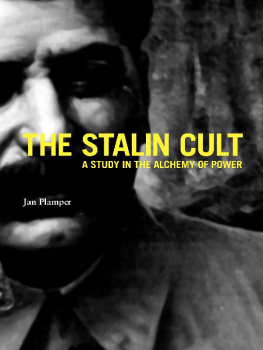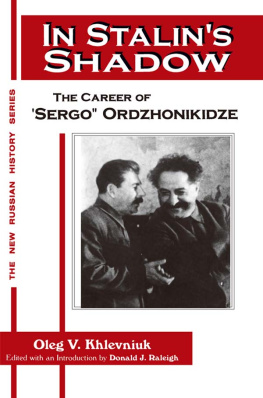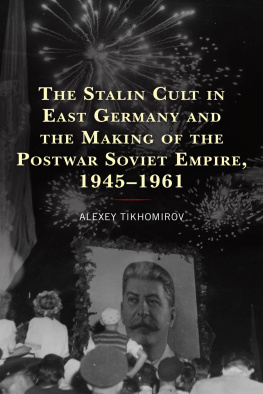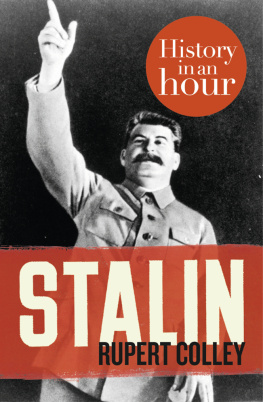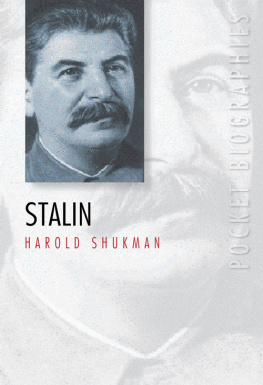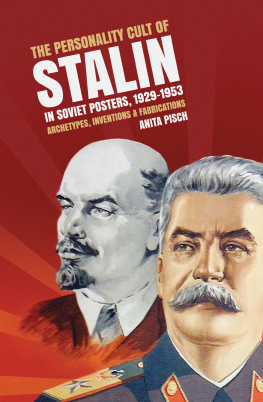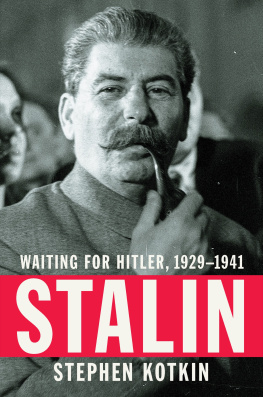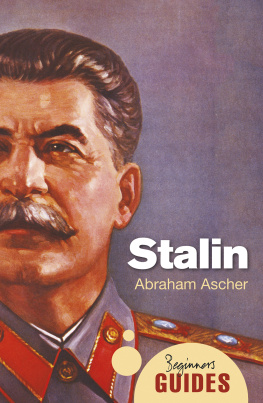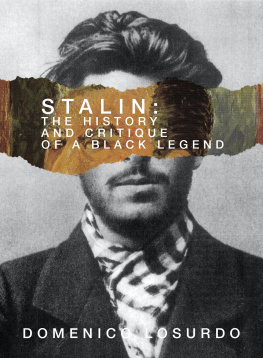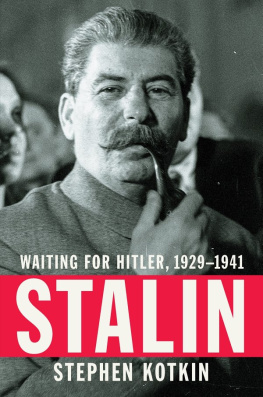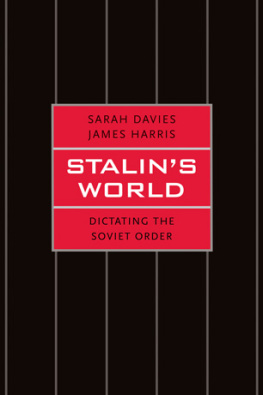Published with assistance from the foundation established in memory of Amasa Stone Mather of the Class of 1907, Yale College.
Copyright 2012 by Yale University and the Board of Trustees of the Leland Stanford Jr. University.
All rights reserved.
This book may not be reproduced, in whole or in part, including illustrations, in any form (beyond that copying permitted by Sections 107 and 108 of the U.S. Copyright Law and except by reviewers for the public press), without written permission from the publishers.
Yale University Press books may be purchased in quantity for educational, business, or promotional use. For information, please e-mail (U.K. office).
Set in Sabon type by Newgen North America, Inc. Printed in the United States of America.
Library of Congress Cataloging-in-Publication Data
Plamper, Jan, 1970
The Stalin cult : a study in the alchemy of power / Jan Plamper.
p. cm. (The Yale-Hoover series on Stalin, Stalinism, and the Cold War)
Includes bibliographical references and index.
ISBN 978-0-300-16952-2 (cloth : alk. paper) 1. Stalin, Joseph, 18791953Influence. 2. Stalin, Joseph, 18791953Public opinion. 3. Stalin, Joseph, 18791953In mass media. 4. Soviet UnionPolitics and government19171936. 5. Soviet Union Politics and government19361953. 6. CultsPolitical aspectsSoviet UnionHistory. 7. Political cultureSoviet UnionHistory. 8. Public opinionSoviet UnionHistory. 9. Mass mediaPolitical aspectsSoviet UnionHistory. I. Title.
DK268.s8p535 2011
947.084'2dc23
2011019576
A catalogue record for this book is available from the British Library.
This paper meets the requirements of ANSI/NISO Z39.481992 (Permanence of Paper).
10 9 8 7 6 5 4 3 2 1
THE
STALIN
CULT
A STUDY IN THE
ALCHEMY OF POWER
JAN PLAMPER
Hoover Institution
Stanford University
Stanford, California
Yale UNIVERSITY PRESS
New Haven and London
THE YALE-HOOVER SERIES ON STALIN, STALINISM, AND THE COLD WAR
In memory of
Veniamin Iofe (19382002)
and
Reginald Zelnik (19362004)
Contents
Acknowledgments
This book has been in the making for years, and the list of debts to acknowledge has become quite long. It all started at Brandeis, where my undergraduate teacher, Gregory Freeze, assigned Michael Cherniavskys Tsar and People. Cherniavskys classic opened my eyes to the symbolic dimensions of power, Greg Freeze to the wonders of Russian history. Without Gregs example and mentorship I would have never become a historian of Russia. In 1992 I read Ian Kershaws pioneering The Hitler Myth and began asking myself if there was something comparable on the Stalin cult. There wasnt. A year later, during eighteen months of social work (in lieu of my German military service) for the anti-Stalinist grassroots organization Memorial, St. Petersburg, I began looking for documentation on the Stalin cult and made first forays into the Party archives of St. Petersburg and Moscow, which had just opened. Ever since this first extended stay in Petersburg, the Scientific and Information Center Memorial has been my logistical, intellectual, and emotional base in Russia. I am very grateful to its current director, Irina Flige. The first dedication of this book is to the memory of its founding director, the late Veniamin Iofe, from whom I learned so much hands-on history.
In 1995 I entered graduate school at Berkeley and embarked on a dissertation on the Stalin cult under the guidance of a committee of unique scholars and human beings. Yuri Slezkine, my main adviser, was an astute and erudite reader, who offered excellent suggestions. He saved me from my own megalomania by convincing me early on to focus on selected aspects, saying that a histoire totale of the Stalin cult was about as realistic as a single-volume history of the cult of Jesus Christ. The late Reginald Zelnik was my second reader. Reggies all-round qualities as teacher, scholar, mentor, homo politicus, and person were legendary long before I arrived at Berkeley; I feel extremely privileged to have experienced them all first-hand and the books second dedication is to his memory. Victoria Bonnell, one of my outside readers, gave crucial support at an early stage, and her book on Soviet political iconography has been an inspiration. A very special thanks must go to Irina Paperno, my other outside reader, who went beyond any call of duty in reading drafts and offering thorough, sharply intelligent criticism. When I got stuck in the process of revising the dissertation for publication, she gently prodded the book to completion. It is hard to put in words how much I value her intellectual and personal support over the years.
Thanks also to my other teachers at Berkeley, especially Carla Hesse, whose way of practicing history has left a deep imprint. And to my cohort of Berkeley graduate students, of whom I would like to single out Peter Blitstein, Chad Bryant, Victoria Frede, Brian Kassof, Ben Lazier, Zhenya Polissky, David Shneer, and Ilya Vinkovetsky. It was only after we all stopped being in one place that I realized how important informal communication with this group of people on a daily basis had been to me.
When I filed the Berkeley Ph.D. thesis in 2001 I was sure I would more likely end up teaching in Kamchatka than where I had gone to Gymnasium, Tbingen. But that was where I ended up. And for the better, it turned out. Dietrich Beyrau, the incomparable director of the Institut fr Osteuropische Geschichte and Landeskunde at the time, gave me all the freedom I needed. He was also very accommodating to my special challenge of trying to bridge two academic cultures, working on a Habilitation and teaching in Germany while at the same time publishing a first book in America. My wonderful colleagues and friends Klaus Gestwa, Katharina Kucher, and Ingrid Schierle deserve huge thanks. They had to witness at close distance the ups and downs of both the project and of a repatriate struggling to adapt to the German university system. I would further like to thank various Tbingen colleagues, some of them visiting professors or scholars, who helped in numerous ways: Michael Hochgeschwender, Oleg Khlevniuk, Yulia Khmelevskaia, Boris Kolonitskii, Anna Krylova, Alek-sandr Kupriianov, Svetlana Malysheva, Christoph Mick, Oksana Nagornaia, Igor Narsky, Olga Nikonova, Natali Stegmann, Yelena Vishlenkova, and Elena Zubkova. Our Slavic librarian Zuzana Kov was exceptionally forthcoming. What is more, at Tbingen I was blessed with stunningly capable research assistants, several of whom have gone on to careers as professional historians: Marc Elie, Luminia Gtejel, Mark Keck-Szajbel, Regine Kramer, Ulrike Lunow, Jens-Peter Mller, and Katharina Uhl. Jannis Panagiotidis and Alexa von Winning deserve to be singled out: they helped in the frantic final stages of manuscript preparation and proofreading.
Several people read portions of the manuscript and made very useful suggestions for improvement: Dmitrij Belkin, Michael David-Fox, Jacqueline Friedlander, Igal Halfin, Oleg Khlevniuk, Katharina Kucher, Sonja Luehrmann, Susan Reid, Ilya Vinkovetsky, and Barbara Walker. Four people took it upon themselves to read an overlong version of the manuscript in its entirety and forced me to make cuts, to revise its structure, and to reframe some of its arguments: Olaf Bernau, Benno Ennker, Jochen Hellbeck, and Yuri Slezkine. I am enormously grateful to them.
A few extra words about Jochen Hellbeck are in order. Jochen took shefstvo over me at an early point and has been an exceptionally warm and good friend ever since. The dialogue with him has been essential to me, and I admire the boldness and sheer beauty of his own scholarship. Thank you, Jochen!
Next page
